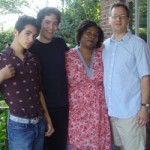Title
When one of my sons brags to family members about his latest romantic interest, the other cannot follow suit because he knows that the response will not be the same, that some people might think he’s strange or, as he says, “going to hell for his lifestyle.” When one talks about his future—about marriage and children—the other knows that what his brother takes for granted will not happen for him, at least not in the traditional sense. When one walks down the street happily holding hands with his new love, experiencing the open joy of loving, the other has to consider whether that simple gesture could result in injury or even death. You see, one of my sons is straight, and the other is gay. Although the particulars are different, as a parent, my goals for them are the same: teaching them to live and love with dignity. Loving both my sons means teaching both of them about heterosexual privilege and the manner in which it affects the way we, as individuals and as a family, function in our society.
Body
Since we became a family with my marriage to their father, we have had to grapple with all the implications of being a blended family. Racially, we are something of a hodge-podge: My husband is Italian-American, my sons are Guatemalan and Italian-American, and I am African-American — so we came to family with an appreciation of cultural differences. Because we fly in the face of traditional notions about family and biology, each of us has had to grapple with how we define family. We worked through much of this with sheer love and determination. So when my husband and I realized that our younger son Michael is gay, we thought we at least had some of the tools to make sure that he would be comfortable in his skin. We thought that we could just love him unconditionally and everything would be just fine.
We soon realized that loving him unconditionally would mean re-educating ourselves and investigating the ways in which his father, his brother, and I participate in a culture in which we really don’t have to question our sexuality. We take the privileges that go along with heterosexuality for granted. We were determined not to create the “don’t ask; don’t tell” policy of loving him to which our extended family subscribes. As Michael says, “They know I am gay. I know they know I’m gay. They know that I know that I’m gay … I get to watch from the sidelines as my brother is embraced as somehow golden for having ‘done it’ with a woman. Extra points if she’s Catholic! My boyfriend was raised Irish-Catholic and knows how to cook. Where are my congratulatory pats on the back?” Indeed, the silence expected in order to get along is unhealthy and breeds resentment. It punishes Michael for being himself.
We had to consider the ways in which sexual orientation is not, as some believe, a problem; we never dissected whether he was “born that way” or if he would “grow out of it.” Instead, we saw his gayness as an opportunity for us to grow as individuals and as a family. We had to sensitize his brother to how his dinner-table dating updates with the grandparents affected Michael, but we didn’t tell him to stop. Their relationship is their own.
We ourselves had to learn that loving him meant giving up some dreams and discovering others. It meant realizing limitations in our ability to parent and protect him—even from people who claim to want what is best for him. Ultimately, however, loving Michael has meant embracing him fully and changing the way we define family.





